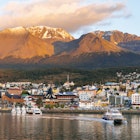
Nov 21, 2024 • 6 min read

Dec 23, 2019 • 7 min read

Greener travel options are increasingly popular © Lia Garcia / Lonely Planet
As the world becomes increasingly aware of its carbon footprint, many tourists are beginning to call into question the environmental impact of travelling. Writer Britany Robinson spoke with some travel bloggers who are promoting greener options.

It’s been five years since I abandoned my own travel blog, but when a conversation about “flight shaming” recently broke out in my Facebook feed, I watched familiar names of prominent travel bloggers pile into the comments to defend their frequent flying habits and travel in general.
Flight shaming (or flygskam, as the term originated in Sweden) was not a thing when I was blogging. Ten years ago (when I entered into the peak of the blogosphere) you were more likely to experience shame over not traveling far or long enough. The accomplished bloggers all had their water-warped passport pages filled with overlapping stamps—proof that life was better without a fixed address.
Back then, more and more people were embracing the ability to live and work nomadically through a global ecosystem of accessible WiFi, cheap living costs in developing countries, and the amplification of connectivity and content through social media. Travel bloggers were showing office workers that life could be different—you could quit your nine-to-five, book a one-way ticket, and the world was yours to explore. You could even make money along the way.
I bought into the dream myself. I also tried to sell it – though perhaps not very well, since I never made much money from travel blogging. But that’s neither here nor there because today, the environmental impacts of traveling from here to (way over) there have taken center stage.
2019 was the year of reckoning with the reality of climate change; we’re now facing a future of rising sea levels, intensifying weather patterns, food shortages, and a sixth mass extinction that’s well underway. The travel industry is responsible for about 8% of the global carbon emissions that got us here. Air travel accounts for 2.5% of total emissions—and forecasts predict that could triple by 2050. 'The dream,' it seems, is becoming harder and more problematic to sell.
“I used to lead with the jetsetting lifestyle in my blog, taking off from the U.S. to Asia for a week without a thought to my carbon footprint,” admits Eileen Cotter Wright of Pure Wander. “I've grown to realize there are better ways to see the world and [encourage] offsetting flying's negative impact. However, I also work to inform my audience about the real implications of flights—how the everyday business travel is what [causes] the vast majority of flight pollution, not the family who's saved forever to take their one vacation a year.”
Lia and her husband, Jeremy, share a familiar story on the homepage of Practical Wanderlust: They quit their jobs, put all their stuff in storage, took a year-long honeymoon, and started blogging as a hobby that eventually turned into a career. According to a recent update to her About page, Lia now makes a multi-six-figure income through Practical Wanderlust. But she’s doing so with a homebase in the Bay Area—no longer on a round-the-world trip.
“I’ve been trying to travel less and stay more rooted,” says Lia. “And I’m planning to offset all of our flights this year.”
Lia admits that her devotion to sustainability is often at odds with her passion for travel which is, “inherently not the greenest hobby.”
But it was the year-long trip around the world that taught Lia and Jeremy they could live with much less; upon their return they began working towards a zero-waste household. Lia can amplify these efforts by sharing them with her readers. One of her most recent posts is an eco-friendly gift guide for travelers, and she now works information on sustainability and responsible travel into most of her stories.
Eileen and Lia don’t actively market their sites as sustainable travel blogs. Instead, they seem to be part of a new generation of travel bloggers who don’t consider sustainability a niche—but rather, a necessary component to preserving the world they love to explore.

Green Global Travel was one of the first blogs to exclusively promote eco-travel – they launched in 2010 when sustainability was very much a niche. But despite that early adoption, co-founder Bret Love doesn’t believe “flight shaming” is the answer to more sustainable travel.
“Trying to shame people into not flying is unrealistic. Even if it did work, it would have a catastrophic economic impact on underprivileged people in developing nations who rely on tourism revenue to feed their families.”
Bret also purchases carbon offsets for his flights around the world, and he published a comprehensive guide on how to reduce your carbon footprint and offset the footprint of travel.
“I'm a big believer that making lots and lots of little changes in our everyday lives can ultimately have a much greater impact than simply not flying.”
Other bloggers are finding ways to encourage those “little changes” within different corners of the travel sphere.
Marielena of Epic 7 Travel is an avid scuba diver, and noted that “I’ve seen firsthand plastic’s deleterious impact choking our oceans over the past two decades.” That’s why she advocates for canvas bags and metal straws on her blog.
Cris of LooknWalk is a vegan who focuses on travel in Europe—she includes vegan recommendations in her travel guides. “As a blogger, lately I’m more vocal about my choices and try to explain how they affect the environment.”

I asked Melvin Boecher of Travel Dudes how he balances travel with concern for the environment. Travel Dudes has been around since 2009 and has since evolved into a “social travel platform.”
“We are not an environmental blog,” he tells me. “But whenever it fits, I'm happy to point out the environmental perspective.” He agrees with Bret that we shouldn’t be ashamed of flying. “I'm happy to take the train, if it wouldn’t take ages to get to the final destination.”
So, are travel bloggers doing enough to influence the impact of the travel they promote? It’s really all over the map.

Bloggers have a lot more influence than most people. That’s why we call them influencers. And they hold a unique position in the travel industry. Loyal readers come to “know” and trust these people whose adventures they follow around the world. They’re also partnering with travel brands and destinations, connecting their readers to powerful institutions in ways that glossy magazines or newspapers – with their stricter separation of editorial and sponsored content – often do not. And these travel industry institutions are the ones that can enact real change, especially if consumers (often blog readers) demand it.
Lia says she doesn’t go on many press trips anymore, and she tries to partner with brands who focus on sustainability. “I did one [press trip] with Norwegian Airlines—they’ve incorporated sustainability into every aspect of their brand. I’m choosing to do more press trips like that—ones that really align with my beliefs, [instead of] these glamorous, exoticized trips.”
Travel bloggers play an important role in a feedback loop that could inspire a big shift in the industry. When they share messages about traveling less, traveling slower, recycling, shopping local, and all of the things that could make travel more sustainable, their readers become more informed. Hopefully, that audience puts their dollars towards the brands and destinations that uphold more responsible travel practices and start to incorporate those tips and tricks into their own travel style.

“The more engaged our audiences, the more impact we have,” says Lia. “I represent my audience’s interests with brands I work with. If I don’t talk about sustainability, I’m going to get pushback. My audience holds me accountable for those decisions.”
Looking back at my own blogger past sometimes makes me cringe. I did things back then I’d never do today. I rode elephants in Thailand, used ALL the plastic water bottles, and I would have been thrilled to accept free travel to just about anywhere. But, like many, I’ve learned a lot since then. If we’re being honest with ourselves and looking at the facts of climate change, we’re all going to have to learn faster, and make bigger changes, like swapping out long-haul flights for nearby destinations. And plenty of bloggers seem to be on board. In another Facebook conversation about what bloggers will be doing differently in 2020, many said, “travel less.”
“Travel is fatal to prejudice, bigotry, and narrow-mindedness,” wrote Mark Twain back in 1869, long before travel blogs were a thing. I still think that’s true. Travel can open minds—maybe even change the world. Travel bloggers can be a part of that change.
But also, Mark Twain never flew.
You may also like:
Kyiv now has an interactive map of vegan restaurants
Flying home of the holidays? Consider buying carbon credits

Sustainable Travel
How to get around France: from cycling to traversing by trainMay 18, 2024 • 7 min read

Nov 21, 2024 • 6 min read

Nov 21, 2024 • 5 min read


Nov 21, 2024 • 9 min read




